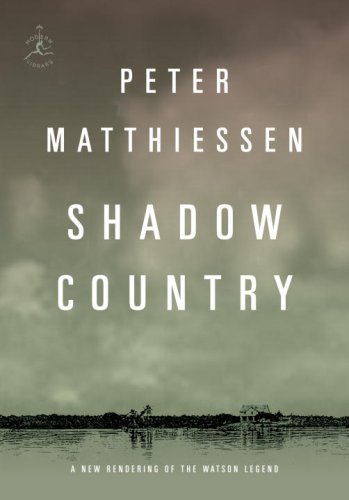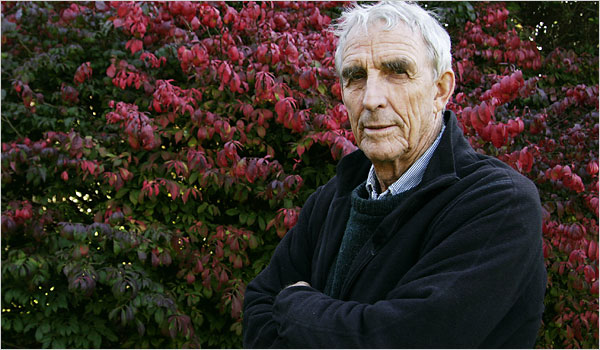Term Paper

Ben Miller
English 213
Term Paper
A Novel of Mythic Proportions
Where to begin – obviously the beginning, I know; yet with so much to say and so little time and room to write, it’s kind of odd that a beginning is always the hardest to start. Perhaps this is why so many stories worth any bit of credibility begin in medias res. Rather than bore an audience with a slow agonizing build up, it’s much more effective to slam the action upon them, thrust so many incredible events under their nose that even though the smelly action may be overwhelming, it’s pungent pleasing aroma teases the nostrils till they beg for more. Peter Matthiessen’s masterpiece of a novel begins exactly in this manner. The prologue of Shadow Country will undoubtedly hook anyone who picks it up; and if it doesn’t, the problem lies not with the text but with the reader, a reader ignorant of so many qualities it’s practically unbelievable they can even recite the alphabet. In this ‘New Rendering of the Watson Legend,’ Matthiessen has seamlessly intertwined massive amounts of conflicts and themes found only in ancient, mythic literature, all enveloped in a dangerous time period of transformation. Nestled in the Ten Thousand Islands of Florida’s Everglades, now a National Wildlife Refuge, Shadow Country exhibits an unprecedented amount of mythological qualities, comparable only to ancient Greek mythology, and should be classified as nothing other than Classical Literature.
Conflicts
Throughout Shadow Country conflicts abound. Around every page something happens; be it horrific, delightful, humbling, or downright evil, conflicts are everywhere and if they weren’t there wouldn’t be much of a purpose for the story, or literature for that matter. Revisiting Steiner’s conflicts from Antigones, which we discussed back in the beginning of the class, it is excessively apparent they are alive throughout Shadow Country as well. These conflicts seem simple, but only on the surface. In order to complicate these conflicts, it’s absolutely necessary to dissect them. But this dissection will not bring about a complete, finished answer, because theses are not those types of conflicts. They are instinctual conflicts, and so ongoing and always pertinent. By being biologically rooted in our species, these conflicts present a diversity of interpretations that may in fact be, infinite. And so anything involving entertainment, and more importantly the arts, can cultivate ideas from these conflicts, which is exactly what Shadow Country exposes.
Edgar Watson, somewhat the protagonist and the antagonist, had at least five wives, at least because throughout the novel more characters arise who unveil a heritage that may have germinated from Ed. Mr. Watson finds himself in all kinds of obscure situations and conflicts with women, whether it’s with his wives or daughters. Matthiessen incorporates the man vs. woman conflict throughout the entire novel, and although women were unable to vote at this time their voice is notably prominent, often, if not always, as the moral equanimity. I remember one situation in particular when Edgar is expecting his second wife – of official marriage – Jane Watson, and his children to arrive and come join him at his new plantation. However at the plantation he lives with his common-law wife Netta. In customary Watson fashion Edgar simply forces Netta and his daughter Minnie, named after his sister, to vacate the plantation. But he isn’t able to do this before Jane and the kids arrive, so he lies and tells them Netta is a servant. This is one instance where the conflict between man and woman is complicated and blurry. It’s evident how worried Watson is about his wife Jane finding out about his plantation wife, yet it is gleaned that Jane knows what is going on. But she knows Edgar’s temper is volatile and so doesn’t question her desperado husband.
Another major conflict between man and woman arises in the third book and is between Edgar’s mother and father. A die-hard confederate, Edgar’s father Elijah experiences a slow, degrading transformation after the civil war and abolition of slavery. Yet even before abolition, Elijah’s wife had been pestering him about the horrific treatment of black people. Once abolition happens and things begin to settle slightly, the confederate Elijah finds himself more and more as an outcast. So what does he do: drink and fight, a lot. And this only escalates the tension and conflict between him and his wife. Mrs. Watson is constantly educating her daughter and when possible Edgar. Of course, her more liberal, educated view on life conflicts with Elijah’s fundamentalist confederate view; this conflict remains prominent during Edgar’s childhood and he witnesses his parents argue a lot. Interestingly, Edgar may have learned from his parents’ conflicts because the relationships he has with his wives are, more or less, good. All of his official wives acknowledge they are deeply in love with him but understand at the same time his temper can be hideous and that he has acquired an untruthful horrible reputation.
The most relevant conflict of Steiner’s, in Shadow Country, is the conflict between the individual and the state. What’s exceedingly interesting is how this conflict progresses throughout the novel, and the many levels this conflict plays on. The prologue immediately displays Mr. Watson’s conflict with the state: a bloody, gruesome, deadly conflict that the entire novel is based around. With widespread rumors rampant, Watson was inevitably going to catch up with this conflict. Matthiessen’s intricate way of complicating Watson’s conflict with the state, in my opinion, is one of many reasons why this novel is phenomenal, especially in book one. By writing each chapter from a different character’s perspective, and in that character’s voice and idiolect, Matthiessen weaves a naturally, somewhat ambiguous, depiction of Edgar Watson. This diverse depiction reveals exactly how complicated Watson’s conflict is with the state.
Book two also gives an ongoing example of the conflict between the individual and the state. Lucius, on his quest to write his father’s ‘true’ biography, brings this conflict upon himself. By scurrying about questioning everybody he can find, Lucius outrages the people of the state who think he is up to no good, making suspect lists and only out for revenge for his father. Ironically, Lucius learns a valuable lesson of truth from a known outlaw, Crockett Daniels, while interrogating him in his jail cell, “’Man wants the truth about Ed Watson,’ Daniels jeered. ‘Where you aim to find it? Smallwoods’ll tell you their truth, Hardens’ll tell you theirs. Fat-ass guard out there, he’ll tell you his and I’ll give you another. Which one you aim to settle for and make your peace with?’” (390). Lucius, the individual, finds himself face to face with his opponent in the state penitentiary where he learns the truth is as diverse as the person who tells it.
In book three Matthiessen presents an older scenario, in the past within the timeframe of the novel, of the conflict between the individual and the state. Upon realizing the horrific treatment of blacks, even freed blacks, throughout the Edgefield district, Selden Tilghman raises his voice against the confederate state, and more importantly the renegade Regulators who are out to make any black man’s life, literally and letterally, a living hell. Tilghman stands up against the state, gives a passionate moral speech and is killed by his own kinsman for his thoughts on equality (514-515).
The conflict between age and youth is a little more subtle. But in book one there is an obvious conflict between Edgar and his first born son, Rob Watson. Rob’s mother died during childbirth and it is unclear to me, so far, exactly how Ed handled this. Rob survived and was ultimately raised for most of his childhood with his father and stepmother Jane. But Watson had a nickname for Rob, Sonborn, which he said with a menacing, cruel tone. What prompted this conflict between father and son? Did Edgar hate his first-born son because his wife died to give birth to Rob? Thus far I cannot answer exactly why this conflict arose and why it remained, until an intimate murderous bonding experience, but it is one that impacted both Rob and Edgar fro the rest of their lives. With a little more of the novel under my belt now, I understand this conflict between Rob and Ed much better. Yes, when Edgar lost his first wife during Rob’s death it was extremely traumatic for the young man. He blamed himself for her death since he impregnated his young wife who may not have been quite old enough to give birth. Upon learning about the death of his wife, Edgar is devastated and cannot even take responsibility for his new son, who he feels is just a bad omen. It isn’t until his second wife encourages him to take responsibility for his son that he returns to his deceased wife’s parents to accept his son. This also is somewhat forced upon him, and it may be that the mere sight of Rob reminds him of his first wife and it’s extremely hard to deal with.
The third book also reveals the most one of the most crucial conflicts of Edgar Watson’s life; and that is between him and his dad, another age-youth battle. Edgar was beaten and abused excessively as a child. In drunken rages his father would lash out against Edgar for any small misstep, whether it was Edgar, his wife, of daughter. Matthiessen does an amazing job portraying Edgar’s confusion with his abusive father. No matter how abusive he is still his father, and during the beginning of the abusive stages, Edgar is lost between hate and love for his dad. It isn’t until his dad nearly kills him, by slamming his head into a fixed house beam, that Edgar grows an abundant hatred for his violent father. And Edgar finally gets his revenge with his own wooden beam, bashing his father, curled in a ball on the floor, repeatedly until he stops trying to fight back. This was a transformation in Edgar’s life that ultimately send him off to begin his own unbelievable legend.
To discuss the conflict between the living and the dead in Shadow Country, along with the individual and the state, could take up enough pages for an entire capstone paper. Strike that; it would take up enough pages for a capstone paper. Edgar Watson’s conflict with the state lead to his death; Edgar Watson dead still remained a conflict for the living state, to the point where people refused to talk about it. What complicates this tricky conflict further is all the people Watson was rumored to have slain during his life, especially on ‘Watson Payday’ as the locals came to call it. The dead who Watson killed were always a leery, almost eerily sacred, dilemma for the people of the Islands to deal with. The most hauntingly heinous murders where those of the Tuckers. When the Hardens discovered their ruined bodies they were nearly unbearable to deal with. Yet they knew it was their moral obligation to put the Tuckers to rest, safely in the ground. The situation with the Tuckers was a conflict between the living and the dead but also was connected with Ed and Rob’s conflict between the young and the old.
Edgar Watson was a religious man with his wife and children but an atheist any other time he discussed god. The conflict between gods and humans is also very interesting throughout Shadow Country. Edgar certainly knows the importance of religion for other people, but when it comes to himself he is extremely ambiguous. And perhaps this is intensified because of the Greek literature he’s bonded with. It was, after all, Uncle Tilghman who bestowed the literature to his nephew; as a youngster Edgar and Selden bonded due to Elijah Watson’s abusive nature towards both of them, “Cousin Selden and I wiped bloody noses. When Selden noticed our peculiar bond, he grinned; I had to scowl at him lest I grin back” (513). Perhaps Edgar submersed himself in his Uncle’s Greek books after he witnessed Tilghman’s murder. If so, Edgar certainly would have been exposed to the barbarity of human nature and thus taken on a very strict stance towards religion of any sort.
Themes
Classical Literature contains a number of important themes and archetypes that help to make it so classic and powerful. There are fluctuations between tragedy and comedy, farting, drinking, killing, exiles, crossroads, epiphanies, and initiations that all seem to happen over and over: the myth of the eternal return. Shadow Country contains all of these archetypes and more. What really weaves these archetypes together to form a novel of mythic proportions has a lot to do with the length of the trilogy, which unfortunately scares off readers who would find it an absolutely amazing read – and what has allowed me to procrastinate on my capstone paper as long as humanly possible. Yet this mimics most people’s ignorant view of Classical Literature, books that are old, redundant and too long to read. And that is incredibly too bad. The length of Shadow Country allows it to reveal elements of the eternal return through classic archetypes, adding to its mythic power.
The exile archetype is notorious throughout the novel. Edgar finds himself exiled, somewhat by himself, to the Ten Thousand Islands. Similar to Ovid’s exile, the reader is not necessarily sure why Edgar has been exiled. As the story develops and we learn more and more about Watson, there are certainly many instances where the reader thinks they have learned the reason behind his exile, but it always remain unclear to an extent. This may in fact be purposeful since exile is a very blurry line. Edgar is not the only one who experiences an exile. After his father’s death, Lucius becomes a pest for the people of Islands and is exiled from his father’s Chatham Bend plantation. On multiple occasions Lucius is told never to return to the islands since there are numerous people who would rather see him dead that return to his father’s territory. In book three, Selden Tilghman also undergoes an exile after he stands up for abolition and black’s rights in a still heavily confederate district. During Selden’s exile, people are so disgusted with him that they never visit him outside Edgefield and his fields become overgrown and useless.
I don’t believe Shadow Country is entirely a tragedy, but there are definitely a number of tragic scenarios. There is even a situation of unparalleled tragic proportions, only matched by Euripides’s immensely tragic plays. During the devastating hurricane of 1910, Edgar’s daughter by Josie Jenkins drowns before she even reaches a year old. Even for a desperado this is as unfortunate as it gets. The death of a child, or anyone in his or her prime, will always be the most tragic thing possible.
Bacchus’s ghost is an ongoing presence throughout the entire novel. All the Watsons have a drinking problem. It is their only release from a constantly labor demanding and violent life. But as we all know excessive drinking can do nothing but harm, to the drinker and everyone around the drinker. Both Elijah and Edgar are banished from lots of bars and saloons for their outrageous, violent drunken behavior that often lands them in jail for a night. But once in awhile drinking acts as a crossroads of sorts. Edgar is smashed off moonshine when he meets his first wife, Sarah, who he becomes madly in love with. Lucius drinks a lot, but often he meets people while drunk in bars, on the street, or has a glass of whiskey at their house and learns valuable information about his father.
The crossroads, or crossrivers, is in the end what leads Edgar Watson to his fate. As Peter Matthiessen mentioned at his lecture, he left it ambiguous whether Watson knew he was headed to his death at Chokoloskee. It become the reader’s own interpretation, their own crossroads of sorts, where the facts, fiction, and legend meet Watson’s death and so the reader must decide what they believed happened. But it was Watson’s choice to return to the Island or flee, a crossroads where he decided his own deadly fate. In my opinion, I believe Watson knew what he was getting into but didn’t expect it to be so excessive. I think he wanted to return to his family and spend time with his wife on her birthday. The fact that his shotgun was empty reveals that he didn’t intend do harm; however, had his shotgun been loaded, perhaps he may have still been able to spend time with his wife and kids on her birthday.
Although Shadow Country is based around a specified time in American history, it’s underlying message, meaning is based entirely around the eternities. And it is these eternal themes that are most important, which is how Henry David Thoreau suggested we read, ‘read the eternities rather than the times.’ However, in context, the times are what entertain the masses, and so it is up to the reader to interpret the present, the here and now, in relation to the past in order to develop a significant, powerful, metamorphic understanding of a piece of literature. But that is only one level. Another level is to dig into life itself, as the meaning is always a question of upmost importance. Matthiessen was well aware of this when he chose a superb quote from a letter by John Keats to begin book two of Shadow Country, “A man’s life of any worth is a continual allegory – and very few eyes can see [its] mystery” (251). A man’s life possesses its own present as much as its past, its ancestors past and so on. To further understand and feel completely satisfied with this sometimes unfortunate, tragic life, it’s important to decipher it through spectacles that can see into the past, not only the present. Matthiessen took one man’s life and deciphered it obsessively, for nearly 30 years, and uncovered a story that incorporates conflicts and themes of such mythic magnitude that his novel, Shadow Country, is an entirely new rendering of a work of classical, mythological literature.
Posted by bmcycleski
at 6:16 PM MDT







